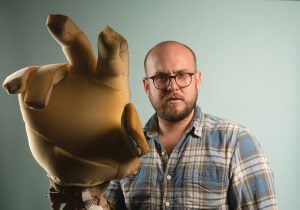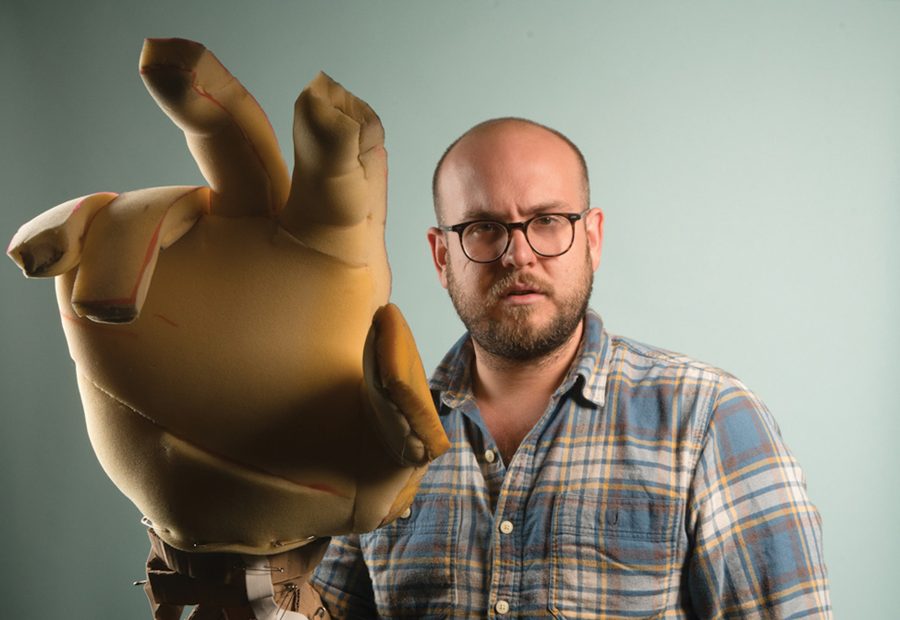
The playwright of Hand to God gets to humanity through puppets
He’s a small-town Texas boy who got roped into puppet club at his church after his dad died. While that’s where the similarities end between playwright Robert Askins and his character Jason, that was enough to spark one of the biggest hits of the theatrical year. Hand to God has thirteen productions (including Curious) on the regional theatre stage this year after coming off a Broadway run that had critics and audiences in stitches.
But there’s also something there – deeper – that Rob was desperate to explore and that audiences only find after having seen and digested the show fully. Here’s what we learned from the playwright about his look at religion and humanity within the world of puppets, sex, and sinners.
Curious: Your play is being done all across the country this season. That must feel great!
Rob: I’m thrilled to see it in so many places. In the beginning, I was just excited to do the play and now to see everyone get on board is cool. It’s being done all over the place. People must have a real hunger to see weird stuff.
Curious: So how to you come up with all that “weird stuff?” Isn’t the play somewhat autobiographical?
Rob: This play deals with how all of us struggle to be good, much like in Sam Sheppard’s work. I wrote this play was for the really young me. It’s very loosely autobiographical. My father passed away when I was in high school and I went through some of the typical self-destructive behaviors. Mom had a puppet ministry, but it was nothing like the one in the play. Puppet ministry was a big thing in the South…one of those weird southern things.
But my play is really different than my life too. For the play, I wanted big gestures and extreme behaviors. When I was studying playwriting and read the work of Sarah Kane [The English playwright whose plays are characterized by a poetic intensity, pared-down language, exploration of theatrical form and, in her earlier work, the use of extreme and violent stage action] it blew me away. I thought if her plays can do that….I can do anything.
Curious: Tell us about your decision to use puppets as characters.
Rob: I think of the puppet as a Mamet character. It allows you to make fun of the other characters and shrinks the devil’s voice. Puppets are immediately funny. They destabilize the narrative. And puppets take things that could be sentimental and blow them apart.
We love the simplicity of Tyrone; he’s not particularly bright. He’s a bully’s version of the truth, a small and deadly contradiction. He shows us that there is danger in the things we tell ourselves as it brings those things to life.
Curious: One of the things our director Dee Covington has talked about is that the play is hilarious on the surface, but has a deep undercurrent that is serious and sad.
Rob: One thing we learned in the first productions is that this play is all over the place tone-wise. Some call it exorcist meets Sesame Street. But it’s important to find the humanity.
Who inhabits each role is really important – they can’t tilt the characters too far into parody. It’s really too easy to play the pastor as if he’s Ned Flanders from the Simpsons, but that is too simple.
As a society we love binary. We want a clean solution to every problem, but human behavior is more complex. Sometimes life shoves a wedge in and we splinter. There’s always the aspirational part of you and the “you” part of you, and the part of you that you can’t stand. We’re complex.
Curious: Any words for our audiences in Denver?
Rob: Denver is a really cool city. Really well poised to enjoy this show – I understand you have a bunch of liberal/hippies as well as a lot of conservatives. And you are growing. All those things live in this play. It’s the little play that could. A tiny play that became huge. I’m so happy it’s enjoying a life in theatres across the country.
